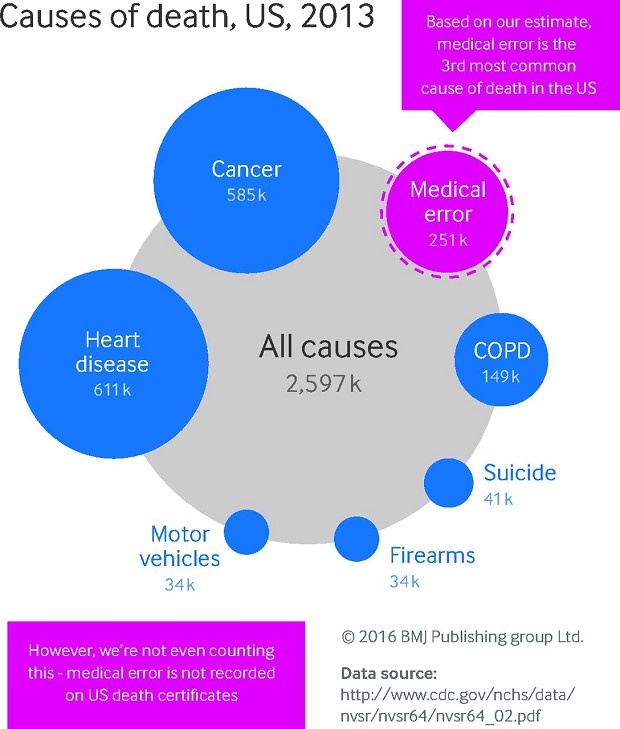Sometime in the last few years, a young woman who had undergone a successful transplant operation was readmitted to the hospital for some follow-up tests, including a procedure to draw fluid from the sac surrounding her heart.
The woman was discharged from the hospital but returned the following day complaining of severe abdominal pain. She died from a combination of intra-abdominal bleeding and cardiac arrest. An autopsy revealed that the needle that had been inserted into the heart sac had grazed her liver and ruptured an artery, resulting in death.
Related: Medicare for All? Why Sanders Has the Edge over Clinton on Health Care
The death certificate listed the cause of death as cardiovascular, but in fact it was due to physician’s error.
The tragic mishap was cited in a new study by two Johns Hopkins University School of Medicine researchers examining the medical errors that have been grossly under-reported for years. They estimate that medical errors are responsible for 251,454 deaths annually.
According to the study, published Tuesday by the British Medical Journal (BMJ), deaths due to gross medical error rank third nationally behind heart disease (614,348 deaths a year) and cancer (591,699 deaths a year). In all, medical errors are responsible for roughly 9.5 percent of all deaths annually, according to the new report.

“While many errors are non-consequential, an error can end the life of someone with a long life expectancy or accelerate an imminent death,” wrote the co-authors, Martin A. Makary, a professor of surgery at Johns Hopkins, and research fellow Michael Daniel.
Related: Hospital Equipment May Have Infected L.A. Patients with Deadly Superbug
It is commonly known that hospital stays and medical procedures are fraught with risk – from patients developing infections and getting the wrong medications to surgeons making a mistake by removing the wrong body part. Moreover, a recent study warned of substantial medical risks involved in simply moving a patient from the hospital back home or to nursing facilities.
Yet the medical profession has done little to shed a light on the problem of medical error, according to the new study, and greater scrutiny is required.
The report’s 251,454 figure for deaths caused by medical error is much higher than the estimates in a 1999 report by the Institute of Medicine (IOM). That report pegged deaths related to medical error at roughly 98,000. As The Washington Post notes, that 17-year-old study shocked the medical establishment and triggered internal debate over how to address the “epidemic” of cases.
Related: Billions in Medicare Fraud Still Rampant Despite Federal Crackdown
However that study was inadequate, according to Makary and Daniel, because it was not backed up by primary research, such as a detailed examination of hospital medical records or even death certificates. Instead, the IOM relied on estimates in a 1984 Harvard Medical Practices Study and 1992 research in Utah and Colorado.
Makary and Daniel mounted a far more comprehensive review of more recent scholarship on the topic, including studies by the Department of Health and Human Services Office of the Inspector General’s review of hospital health records in 2008, and Agency for Healthcare Research and Quality studies between 2000 and 2008.
“We calculated a mean rate of death from medical error of 251, 454 a year using the studies reported since the 1999 IOM report and extrapolating to the total number of U.S. hospital admissions in 2013,” the authors wrote.
While the assumptions they made in extrapolating study data to the overall U.S. population may have distorted their figures, the authors wrote, “the absence of national data highlights the need for systematic measurement of the problem.”





